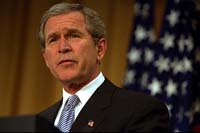Bush remains noncommital on changes in US troop levels in Iraq
U.S. President George W. Bush said Monday that he hasn't decided yet on whether to send more American troops to Iraq or to begin bringing them home, saying he is awaiting recommendations from the military.

He also shrugged off heavy demonstrations that greeted him in Indonesia, saying it was a sign of a healthy democracy.
"I applaud a society where people are free to express their opinion," Bush said of the protests that accompanied his visit to the world's most populous Muslim nation.
Bush held a joint news conference in Indonesia's presidential palace with Indonesian President Susilo Bambang Yudhoyono.
The Indonesian leader, a close ally in Bush's war on terror, called for other nations to do more in helping to find ways to ease the Iraq conflict. "The global community must be also responsible for solving the problems in Iraq," not just the United States, Yudhoyono said.
Bush was asked about proposals by some members of Congress, including 2008 presidential hopeful John McCain, to send more troops to Iraq in an effort to stabilize the country.
"I haven't made any decisions about troop increases or troop decreases, and won't until I hear from a variety of sources," Bush replied.
McCain on Sunday called for sending in 20,000 more U.S. troops to Iraq in addition to the roughly 140,000 there now to help curb rising sectarian violence.
The president noted that Gen. Peter Pace, the chairman of the Joint Chiefs of Staff, was at work on a thorough review of options for Iraq, a war that figured heavily in the loss earlier this month of control of Congress by Bush's Republican party.
Bush's unpopularity in Indonesia made security jitters and angry protests the hallmarks of his six-hour trip to court Indonesian favor.
Through sheets of sometimes heavy rain, Bush flew by helicopter from the capital, Jakarta, to the lush hilltop suburb of Bogor for talks with the Indonesian leader.
"It's to Indonesia's credit that it's a society where people are able to protest and say what they think," Bush said. He noted that it wasn't the first time he had drawn protests.
"That's what happens when you make hard decisions," Bush said.
He praised Yudhoyono's leadership, and called Indonesia "an example of how democracy and modernization can present an alternative to extremism."
Yudhoyono, asked about the U.S. dilemma in Iraq, said any long-term solution would depend on other nations stepping forward and helping.
"Indonesia believes very strongly if we could work together, if we share and exchange our ideas, then there must be a proper and realistic solution...for Iraq," he said.
"We have to involve other parties," he added.
The two leaders said they discussed Iraq and broader Middle East issues, nuclear programs in Iran and North Korea, ways of combatting avian flu, and educational issues, reports AP.
Bush told the Indonesian leader: "You lead a large and diverse nation with a very bright future."
Commenting on Indonesia's ethnic diversity and size, Bush said, "I don't think the American people understand how big Indonesia is."
Subscribe to Pravda.Ru Telegram channel, Facebook, RSS!


